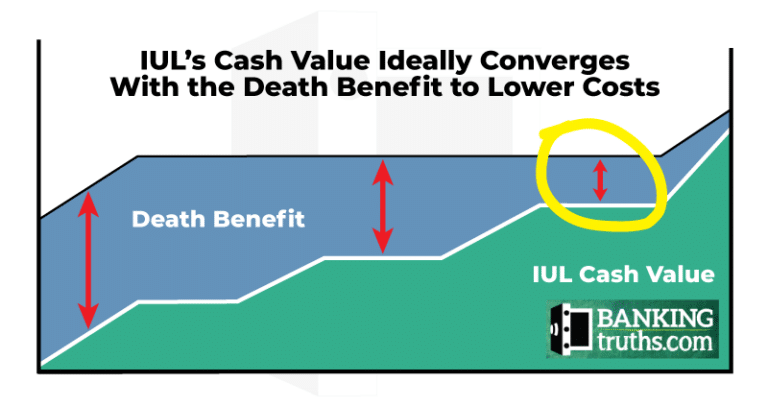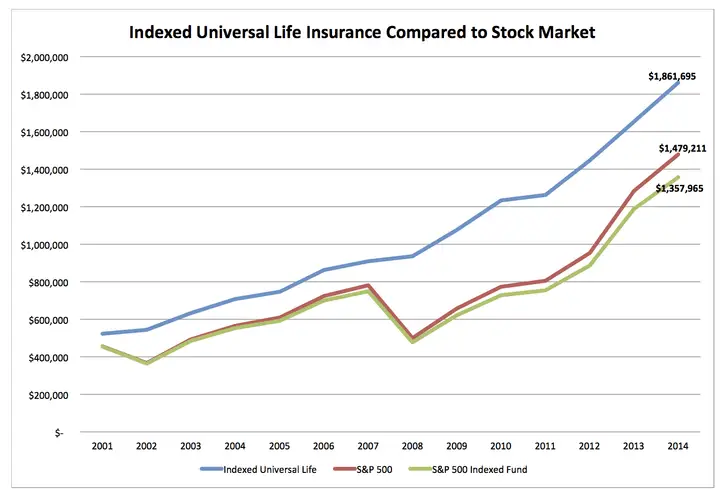All Categories
Featured
Table of Contents
1), commonly in an effort to defeat their classification averages. This is a straw man argument, and one IUL people enjoy to make. Do they compare the IUL to something like the Vanguard Total Amount Securities Market Fund Admiral Shares with no lots, a cost ratio (EMERGENCY ROOM) of 5 basis factors, a turnover ratio of 4.3%, and a phenomenal tax-efficient record of circulations? No, they compare it to some awful proactively taken care of fund with an 8% tons, a 2% ER, an 80% turn over proportion, and a terrible record of short-term resources gain distributions.
Common funds frequently make annual taxable circulations to fund proprietors, also when the value of their fund has actually decreased in worth. Mutual funds not only call for earnings reporting (and the resulting yearly tax) when the mutual fund is increasing in value, however can likewise enforce revenue taxes in a year when the fund has actually decreased in worth.
That's not how mutual funds work. You can tax-manage the fund, collecting losses and gains in order to lessen taxable distributions to the financiers, but that isn't in some way going to change the reported return of the fund. Only Bernie Madoff kinds can do that. IULs prevent myriad tax obligation traps. The possession of mutual funds might need the mutual fund owner to pay estimated tax obligations.

IULs are very easy to place to make sure that, at the proprietor's death, the beneficiary is not subject to either income or estate taxes. The exact same tax reduction techniques do not work almost also with shared funds. There are many, typically pricey, tax obligation catches related to the moment buying and marketing of shared fund shares, catches that do not relate to indexed life Insurance policy.
Opportunities aren't extremely high that you're going to go through the AMT because of your shared fund distributions if you aren't without them. The rest of this one is half-truths at ideal. For example, while it holds true that there is no income tax as a result of your beneficiaries when they inherit the proceeds of your IUL policy, it is likewise real that there is no income tax as a result of your heirs when they acquire a common fund in a taxed account from you.
Universal Life Vs Whole Life Which Is Better
The federal inheritance tax exception limitation mores than $10 Million for a couple, and growing each year with inflation. It's a non-issue for the substantial bulk of medical professionals, much less the rest of America. There are better means to avoid estate tax concerns than acquiring investments with low returns. Mutual funds might cause earnings taxes of Social Safety advantages.

The development within the IUL is tax-deferred and may be taken as free of tax income through finances. The plan owner (vs. the shared fund supervisor) is in control of his/her reportable earnings, thus enabling them to reduce and even eliminate the tax of their Social Safety and security benefits. This is great.
Here's another marginal issue. It's true if you get a shared fund for say $10 per share right before the distribution date, and it disperses a $0.50 distribution, you are after that mosting likely to owe tax obligations (probably 7-10 cents per share) in spite of the reality that you have not yet had any gains.
In the end, it's really concerning the after-tax return, not just how much you pay in taxes. You're likewise probably going to have even more cash after paying those taxes. The record-keeping needs for having common funds are substantially extra complicated.
With an IUL, one's documents are kept by the insurance coverage business, duplicates of annual statements are sent by mail to the owner, and distributions (if any type of) are completed and reported at year end. This set is likewise kind of silly. Certainly you need to keep your tax documents in case of an audit.
Nationwide Single Premium Ul
All you need to do is push the paper right into your tax obligation folder when it turns up in the mail. Barely a reason to purchase life insurance policy. It's like this guy has actually never ever bought a taxed account or something. Common funds are generally part of a decedent's probated estate.
On top of that, they go through the delays and expenditures of probate. The profits of the IUL policy, on the other hand, is constantly a non-probate circulation that passes outside of probate straight to one's called recipients, and is therefore not subject to one's posthumous creditors, undesirable public disclosure, or similar hold-ups and costs.
We covered this set under # 7, however just to summarize, if you have a taxable shared fund account, you must place it in a revocable trust (or perhaps simpler, use the Transfer on Fatality designation) in order to avoid probate. Medicaid incompetency and lifetime income. An IUL can offer their owners with a stream of earnings for their whole life time, despite how much time they live.

This is beneficial when arranging one's affairs, and transforming possessions to revenue prior to a retirement home confinement. Mutual funds can not be converted in a comparable manner, and are usually considered countable Medicaid properties. This is one more stupid one advocating that poor people (you understand, the ones who need Medicaid, a federal government program for the poor, to spend for their retirement home) ought to utilize IUL instead of mutual funds.
National Life Iul
And life insurance policy looks horrible when compared relatively versus a retirement account. Second, individuals that have cash to purchase IUL over and past their retirement accounts are going to need to be horrible at managing money in order to ever receive Medicaid to spend for their assisted living home costs.
Persistent and terminal disease motorcyclist. All plans will certainly permit a proprietor's very easy access to cash money from their policy, typically waiving any type of surrender penalties when such individuals suffer a major disease, require at-home treatment, or come to be confined to an assisted living facility. Shared funds do not offer a similar waiver when contingent deferred sales costs still use to a shared fund account whose proprietor needs to sell some shares to fund the costs of such a keep.
Variable Universal Life Calculator
You obtain to pay even more for that benefit (rider) with an insurance coverage plan. Indexed universal life insurance coverage provides fatality benefits to the beneficiaries of the IUL proprietors, and neither the proprietor nor the recipient can ever before lose cash due to a down market.
Currently, ask on your own, do you in fact need or desire a death benefit? I definitely don't require one after I get to economic freedom. Do I want one? I expect if it were cheap sufficient. Obviously, it isn't low-cost. Usually, a purchaser of life insurance policy pays for truth cost of the life insurance policy advantage, plus the expenses of the plan, plus the revenues of the insurance provider.
Universal Life Insurance Questions
I'm not entirely certain why Mr. Morais threw in the entire "you can't lose cash" again below as it was covered quite well in # 1. He simply intended to duplicate the most effective selling point for these things I suppose. Once again, you do not lose nominal dollars, yet you can lose real bucks, as well as face severe chance cost as a result of low returns.

An indexed global life insurance policy plan owner might trade their plan for a completely different plan without causing income taxes. A shared fund proprietor can not move funds from one shared fund firm to one more without offering his shares at the former (therefore setting off a taxable event), and redeeming new shares at the latter, frequently based on sales costs at both.
While it is real that you can exchange one insurance coverage for an additional, the reason that individuals do this is that the initial one is such a dreadful plan that even after buying a brand-new one and experiencing the very early, negative return years, you'll still come out ahead. If they were marketed the appropriate policy the initial time, they shouldn't have any need to ever before exchange it and go with the early, unfavorable return years once more.
Latest Posts
Best Universal Life
Index Universal Life Vs Roth Ira
Universal Life Insurance Tax Advantages